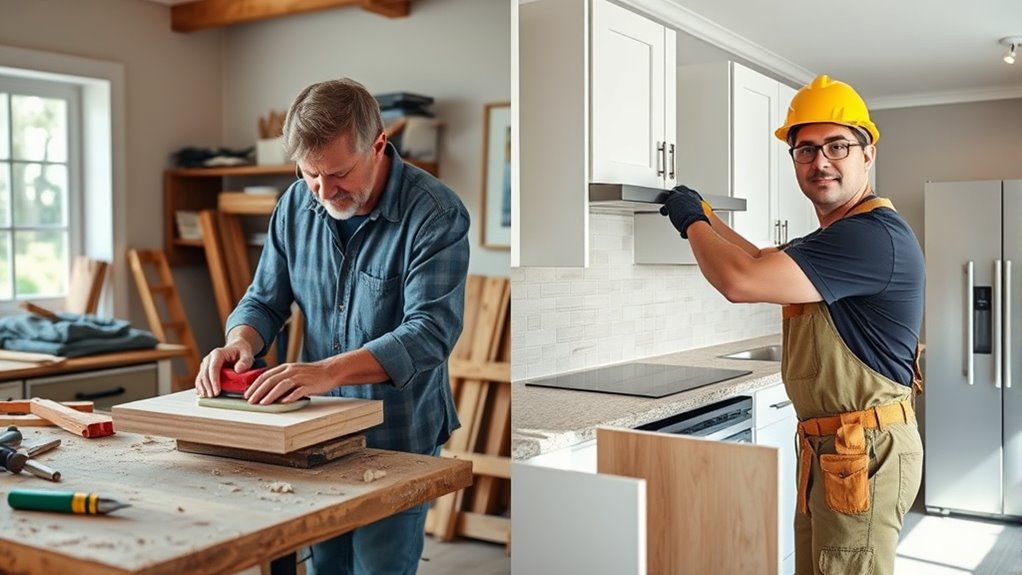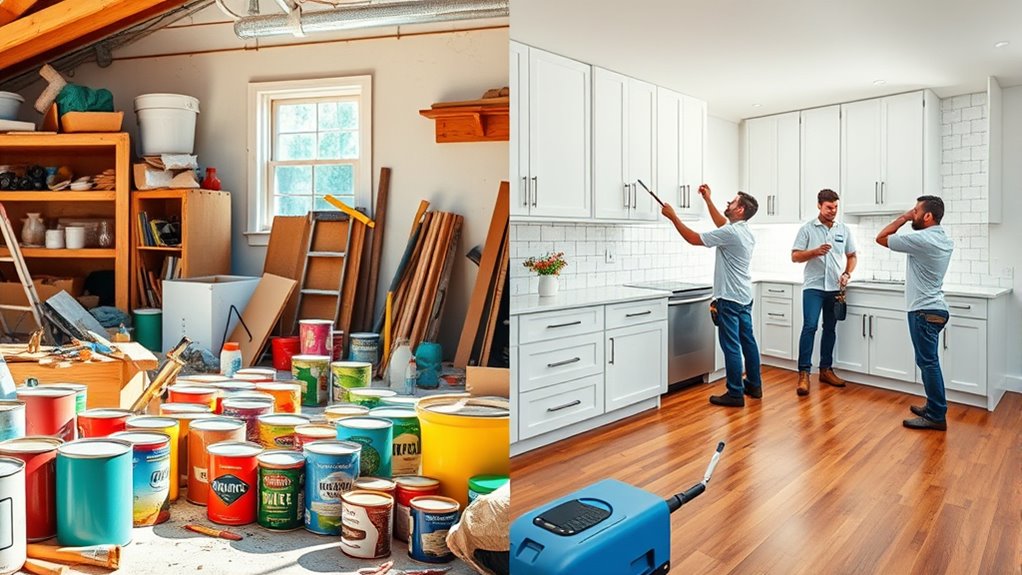When deciding whether to DIY or hire a pro, consider your budget, skills, and project complexity. DIY can save money on simple tasks and help you develop new skills, but mistakes in complex jobs can be costly and unsafe. Professionals often work faster and ensure quality, safety, and compliance. To make the best choice, weigh your resources carefully—there’s more to uncover that can help you decide confidently.
Key Takeaways
- Assess project complexity and safety requirements to determine if professional expertise is necessary.
- Consider your skill level and available time, opting for DIY for simple tasks and professionals for complex ones.
- Evaluate overall costs, including potential errors and repairs, to decide if hiring a pro offers savings.
- Prioritize safety and quality assurance, especially for electrical, plumbing, or structural projects.
- Balance your budget, skills, and project urgency to make an informed decision between DIY and hiring a professional.

Deciding whether to do it yourself or hire a professional can be challenging, especially when you want the job done right. You’re weighing the benefits of saving money against the risks of mistakes and potential delays. One major factor to consider is cost efficiency. Doing it yourself might seem cheaper upfront because you won’t pay labor costs, but it’s essential to assess whether you’ll save enough money in the long run. For small or straightforward projects, DIY can be more cost-effective, especially if you already have some skills or tools. However, for complex tasks, errors can end up costing more in materials, repairs, or redoing work. A professional, on the other hand, often has the experience to complete the job efficiently and correctly the first time, which can save you money overall.
Another vital aspect is skill development. When you choose to do it yourself, you gain hands-on experience and learn new skills that can be useful for future projects. This can be incredibly rewarding and empower you to take on more home improvements over time. Developing your skills can also lead to a sense of accomplishment and confidence, making you more comfortable handling similar tasks in the future. That said, it’s important to honestly evaluate your abilities and knowledge before starting. If a project involves electrical work, plumbing, or structural modifications, it’s often best to hire a pro, not only for safety reasons but to guarantee code compliance and avoid costly mistakes.
Deciding whether to DIY or hire a professional also involves considering time. If you have ample free time and enjoy hands-on work, you might find the process rewarding. But if your schedule is tight or the project deadline is vital, hiring a pro can be more practical. Professionals usually work faster and with more precision, reducing the risk of delays or subpar results. Additionally, understanding the proper shifting techniques and tire maintenance can prevent future issues and ensure your bike remains in good condition. However, if you’re enthusiastic to learn and have the patience to troubleshoot problems along the way, DIY can be a fulfilling choice.
Ultimately, the decision hinges on balancing your budget, skills, time, and the project’s complexity. While DIY projects promote skill development and can be cost-efficient for small jobs, hiring a professional often guarantees quality, safety, and efficiency — especially for more involved tasks. Carefully assess your abilities and resources, and don’t hesitate to seek professional advice or assistance when needed. This way, you’ll make an informed choice that guarantees your home improvement project turns out just as you envision.
Frequently Asked Questions
What Safety Precautions Should I Consider for DIY Projects?
When tackling DIY projects, safety should always come first. Make sure you wear proper safety gear, like gloves, goggles, and masks, to protect yourself from hazards. Stay aware of potential risks in your workspace, such as sharp tools or electrical hazards. Keep your area organized to prevent accidents, and don’t rush. Being cautious and prepared helps you avoid injuries and guarantees your project goes smoothly.
How Do I Assess My Skill Level for a Project?
Did you know nearly 60% of DIY projects face setbacks due to overestimating skills? To assess your skill level, honestly evaluate your assessment skills and experience with similar projects. Consider the project complexity, tools needed, and your comfort level with tasks involved. Break it down into steps, and if any part feels overwhelming, it’s smart to seek help or hire a pro. Safety and quality depend on honest self-assessment.
What Tools Are Essential for DIY Home Improvements?
You need essential tools like power tools and measuring instruments for DIY home improvements. Power tools such as drills, saws, and sanders speed up tasks and make work easier, while measuring instruments like tape measures, levels, and squares guarantee accuracy. Having these tools on hand helps you work efficiently and achieve professional-looking results. Start with these basics, and expand your collection as your projects become more complex.
How Long Does a Typical DIY Project Take?
Wondering how long a DIY project takes? Well, it depends on your project timeline and honest skill assessment. You might expect a quick weekend, but reality often says otherwise—extra trips to the store, unexpected setbacks, and learning curves. So, you’ll probably need more time than planned, especially if you’re new to the task. Patience and realistic expectations are your best tools for turning that project from dream to done.
When Should I Prioritize Hiring a Professional Over DIY?
You should prioritize hiring a professional when the project’s complexity exceeds your skills or when cost estimation shows that mistakes could be costly. If you lack experience with electrical, plumbing, or structural work, bringing in an expert guarantees safety and quality. For simpler tasks, DIY might save money, but for complex projects, professionals can prevent costly errors and deliver better results efficiently.
Conclusion
Deciding whether to DIY or hire a pro depends on your skills, budget, and the project’s complexity. Did you know that 78% of homeowners who tackle projects themselves end up spending more than expected? Sometimes, saving money isn’t worth the stress or potential mistakes. Weigh the risks and benefits carefully. When in doubt, hiring a professional can save you time, money, and headaches—making your home improvement journey smoother and more successful.









